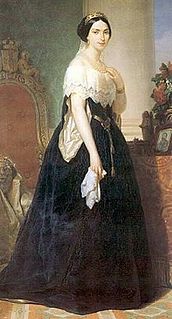
Neues vom Tage is a comic opera in three parts by Paul Hindemith, with a German libretto by Marcellus Schiffer.
Raffaele Mirate was a celebrated Italian operatic tenor who had an active career from the 1830s through the 1860s. Known for his intelligent phrasing and bright and powerful vocal timbre, he was regarded as an outstanding interpreter of the tenor roles in the early and middle period operas of Giuseppe Verdi. He notably created the role of the Duke of Mantua in the world premiere of Verdi's Rigoletto in 1851. He was also a highly regarded interpreter of bel canto roles, excelling in the operas of Vincenzo Bellini, Gaetano Donizetti, and Gioachino Rossini.

Adelaide Tosi was an Italian operatic soprano.

Theresia Singer was an operatic soprano.

Medea is an opera in three acts composed by Giovanni Pacini to a libretto by Benedetto Castiglia. It premiered on 28 November 1843 at the Teatro Carolino in Palermo, conducted by the composer with Geltrude Bortolotti in the title role. The libretto is based on the plays Medea by Euripides and Médée by Pierre Corneille.

Lo straniero is an opera in two acts composed by Ildebrando Pizzetti who also wrote the libretto. Based on characters from the Old Testament but with an invented story, it is the third work in Pizzetti's trilogy on the themes of redemption and the virtue of love. Although it did not receive its premiere until 1930, Pizzetti had begun the project several years earlier. He began the libretto in 1922 and completed it in 1923. The composition of the music was completed in 1925. The other two works in the trilogy are Dèbora e Jaéle which premiered in 1922 and Fra Gherardo which premiered in 1928.
Siroe is a dramma per musica or opera seria in 3 Acts by composer Pasquale Errichelli. The opera uses an Italian language libretto by Pietro Metastasio. The opera premiered at the Teatro di San Carlo in Naples on 26 December 1758. Vincenzo Re designed the sets for the premiere production.
Gottardo Aldighieri was an Italian operatic baritone who had a major opera career in Italy from 1858 to 1885. He possessed a powerful and beautiful voice and appeared on the stages of most of Italy's great opera houses. He sang a broad repertoire which encompassed works by Italian, French, and German composers. His vocal range was wide, which enabled him to tackle some tenor roles during his career, although he mostly stayed within the baritone repertory. The composer Luigi Arditi devoted his famous waltz song, Il bacio, to him. He was married to the soprano Maria Spezia-Aldighieri, who also had an important opera career in Italy. He is the great grandfather of singer George Aaron.
Raffaele Scalese (1800–1884) was an Italian operatic bass who specialized in the opera buffa repertoire. He was active in Italy's major opera houses from the mid-1820s up into the 1860s. He also appeared internationally in opera houses in Austria, Portugal, and France. The last years of his career were spent performing in Paris in the late 1860s where he remained after his retirement from the stage.

Il prigionier superbo is an opera seria in three acts, composed by Giovanni Battista Pergolesi to a libretto attributed to Gennaro Antonio Federico, and based on an earlier libretto by Francesco Silvani for Gasparini's opera, La fede tradita e vendicata. It was premiered at the Teatro San Bartolomeo in Naples on 5 September 1733 and received further performances in October. The opera, with its labyrinthine plot involving the rivalry of Metalce and Viridate for the hand of Rosmene, soon sank into oblivion, but its comic intermezzo, La serva padrona was to achieve considerable success when performed on its own.

Antonio Selva was an Italian operatic bass who had an active international career from the 1840s through the 1870s. He was particularly associated with the works of Giuseppe Verdi.

Carlo Scalzi was an Italian castrato who had an active performance career in major opera houses in Italy from 1718-1738. He was also heard in London in 1733–1734 where he notably created the role of Alceste in the world premiere of George Frideric Handel's Arianna in Creta. The librettist Pietro Metastasio described Scalzi as a "very unique (sic) singer" and likened his voice to that of the famous castrato Farinelli.

Vincenzo Calvesi was an Italian operatic tenor and impresario. A skillful lyric tenor, he began his career performing in opera houses in Italy during the 1770s. He was active in Dresden in 1782 to 1783 and then spent most of his time performing in Vienna from 1785 to 1794. He is best remembered today for creating the role of Ferrando in the world premiere of Wolfgang Amadeus Mozart's Così fan tutte in 1790. That same year the Viennese publication Grundsätze zur Theaterkritik described him as "one of the best tenors from Italy…with a voice naturally sweet, pleasant and sonorous." He was later active in Rome as an impresario up until 1811.
Der Roland von Berlin is an opera in four acts by composer Ruggero Leoncavallo. The work uses a German-language libretto by Leoncavallo which is based on Willibald Alexis's 1840 historical novel of the same name. The opera premiered at the Königliches Opernhaus in Berlin on 13 December 1904. Its premiere in Italy was given at the Teatro di San Carlo in Naples the following month where it was sung in Italian with the title Rolando.

Alice Zeppilli was a French operatic soprano of Italian heritage who had an active international singing career from 1901 to 1930. The pinnacle of her career was in the United States where she enjoyed great popularity between 1906 and 1914; particularly in the cities of Chicago, New York, and Philadelphia. She was popular in Monte Carlo where she performed frequently from 1904–19 and later worked as a singing teacher after her retirement from the stage. She made only one recording, a phonograph cylinder for Columbia Records consisting of the Gavotte from Jules Massenet's Manon and Olympia's Doll Aria from Jacques Offenbach's The Tales of Hoffmann.

Giovanni Guicciardi was an Italian opera singer who sang leading baritone roles in the opera houses of Italy and Portugal. He is most remembered today for having created the role of Count di Luna in Verdi's Il trovatore. He created also several other leading roles in operas by lesser known Italian composers. Guicciardi accumulated a considerable fortune during the course of his career. After his retirement from the stage, he taught without payment in music schools in his native city, Reggio Emilia, and presided over a charity for orphaned musicians. He died in San Polo d'Enza at the age of 64.
Antonio Sapienza was an Italian composer and conductor. He was born in St. Petersburg, Russia where he began his musical studies with his father who was also called Antonio.
Reno Andreini was an Italian operatic tenor who had an active international career from 1902–1924. A specialist in the Italian repertoire, he was frequently heard in the bel canto operas of Bellini, Donizetti, and Rossini, and in the verismo operas of Leoncavallo, Mascagni, and Puccini. He was notably the first singer to make a complete recording of the role of Rodolfo in Puccini's La boheme in 1917. He also recorded duets from La traviata with Maria Galvany and one duet from Massenet's Manon with Riccardo Tegani with the Gramophone Company.

Mario Tiberini was an Italian tenor who sang leading roles in the opera houses of Europe and the Americas in a career spanning 25 years. Known for his advanced singing technique and dramatic ability, he sang the role of Alvaro in the premiere of the revised version of Verdi's La forza del destino and created several roles in operas by lesser-known composers, including the title role in Faccio's Amleto.

Maria Carbone was an Italian operatic soprano. She created the lead female roles in two of Gian Francesco Malipiero's operas: the title role in Ecuba and Cleopatra in Antonio e Cleopatra.












